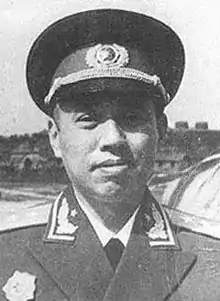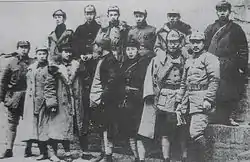Chen Bojun
Chen Bojun (陈伯钧 or 陈国懋; pinyin:Chén Bójūn or Chén Guómào; November 26, 1910 – February 6, 1974), was a general of the People's Liberation Army from the Sichuan Province, Dachuan District.
Chen Bojun | |
|---|---|
陈伯钧 | |
 | |
| Dean for the PLA National Defence University | |
| In office September 1962 – May 1965 | |
| Chairman | Mao Zedong |
| Personal details | |
| Born | November 26, 1910 Dachuan District, Sichuan, Qing Empire |
| Died | February 6, 1974 (aged 63) Beijing |
| Political party | Communist Party of China |
| Alma mater | Whampoa Military Academy |
| Awards |
|
| Military service | |
| Allegiance | |
| Branch/service | |
| Years of service | 1927–1974 |
| Rank | |
| Commands | Eighth Route Army |
| Battles/wars | Long March, Sino-Japanese War, Chinese Civil War |
Chen Bojun was trained in Whampoa Military Academy in 1926, and joined the Chinese Communist Party in 1927, participating in the Autumn Harvest Uprising. He rose through the ranks, holding many divisional level commands and participated in the Long March. During the Second Sino-Japanese War and the Chinese Civil War, he held top positions in the Fourth Field Army and the Eighth Route Army. After the establishment of the PRC, Chen held the roles of commander of Hunan's garrison, PLA Military Academy's Vice Head Training and acting Head of the Academy. In 1955, Chen was awarded the rank of a General.
Biography
During the Early Red Army
Chen's participation in the May Fourth Movement and nationalistic inclination led to him being expelled from the Wanxian Shen Provincial School in 1916. In 1926 he enrolled in the Republic of China Military Academy in Wuhan. In May 1927, Chen joined the Chinese Communist Party at Xianning during the Autumn Harvest Uprising

In October 1934, Chen took part in the Long March and was appointed Commander of the Red Ninth Army. On July 21, 1935, Chen was demoted to chief commissioner of the Red Army University as he refuted the orders of Zhang Guotao to go against Mao Zedong route of the march.[1]
Sino-Japanese War (1936-1945)
Chen served as one of the divisional commanders of the Eighth Route Army during the Sino-Japanese War. As the head of the Counter-Japanese Military and Political University in 1938, he opposed Mao's marriage to Jiang Qing.[2] During his return to Yan'an in 1940, Chen authored a book on "A Brief History of the Eighth Route Army".[3]
Chinese Civil War (1945-1949)
In May 1948, he served as deputy commander of the Northeast Field Army's First Corps, participating in the Liaoshen Campaign, the Siege of Changchun and the Pingjin Campaign. In January 1949, he served as deputy commander of the Tianjin garrison.[4]
After the Establishment of the PRC

In December 1952, Chen served as Deputy Minister of the Department of the PLA Military Training Academy. In 1953, Chen was the deputy Minister of Education and Vice President of the Military Academic Research Department in 1955.[5] In the same year Chen was awarded the rank of general, Order of Bayi, Order of Liberation and Order of Independence and Freedom. During the Cultural Revolution , Chen was persecuted by the Red Guards, and framed by Lin Biao.[6]
On February 6, 1974, Chen died of illness in Beijing.[7]
References
- "长征中的红军"干才"——陈伯钧". news.xinhuanet.com. Retrieved 2015-09-29.
- "毛泽东枪下留生的开国上将为何反对他娶江青". www.njdaily.cn. Archived from the original on 2014-12-19. Retrieved 2015-09-29.
- "陈伯钧--中国共产党新闻--中国共产党新闻网". cpc.people.com.cn. Retrieved 2015-09-29.
- 萧劲光传. China: 当代中国出版社. 2011. p. 174. ISBN 9787801709950.
- "陈伯钧:从排长到开国上将". news.xinhuanet.com. Retrieved 2015-09-29.
- "开国上将陈伯钧被林彪诬陷三件"历史罪行"". news.ifeng.com. Retrieved 2015-09-29.
- "陈伯钧生平介绍". www.1-123.com. Archived from the original on 2015-09-30. Retrieved 2015-09-29.